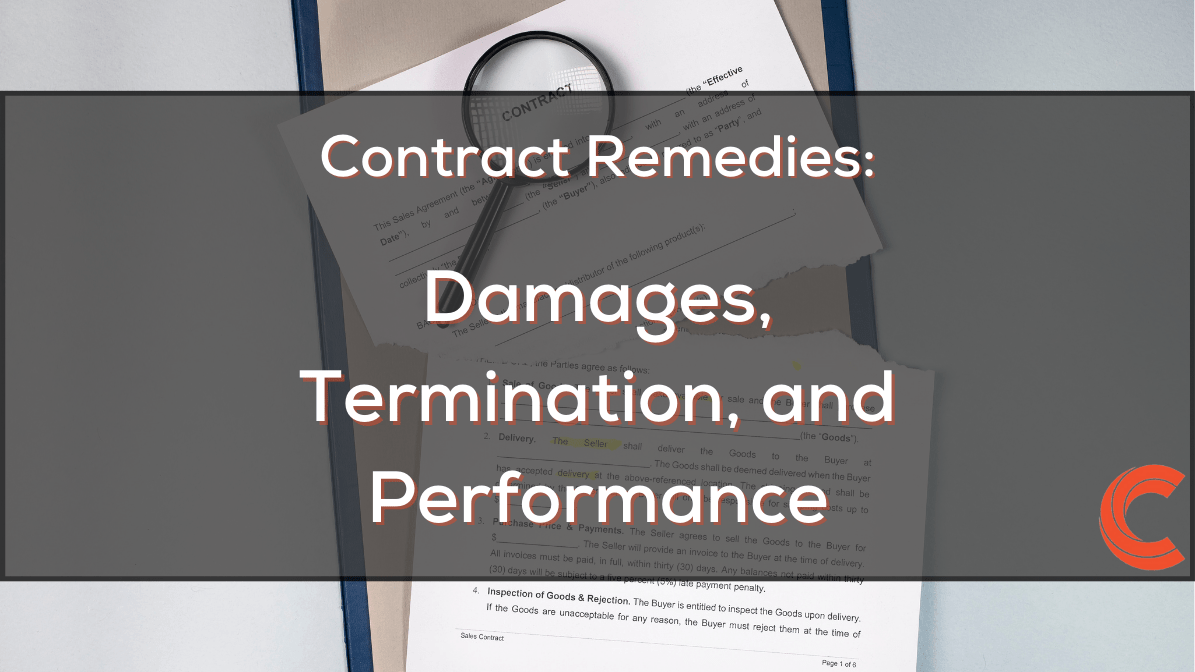Understanding the array of remedies available is crucial for businesses seeking to enforce their contractual rights effectively. This guide aims to decode the complexities of contract remedies, delving into the nuances of damages, termination, and specific performance. By unraveling these legal intricacies, businesses can navigate contractual disputes with clarity. This way, they make sure that the appropriate remedies are employed to take care of their interests.
1. Damages: Compensation for Breach of Contract
Types of Damages:
- Explore the various types of damages, including compensatory, consequential, and punitive damages. Each serves a distinct purpose in addressing different aspects of a breach.
Compensatory Damages:
- Understand how compensatory damages aim to financially compensate the non-breaching party for the losses incurred due to the breach of contract.
Consequential Damages:
- Delve into the realm of consequential damages, which go beyond direct losses and address the indirect or special damages resulting from the breach.
Punitive Damages:
- Explore the rare but impactful realm of punitive damages, designed to punish the breaching party for willful misconduct or egregious behavior.
2. Termination: Ending the Contractual Relationship
Termination for Breach:
- Uncover the circumstances under which a party can end a contract due to the other party’s breach, and the legal implications of such termination.
Material Breach vs. Minor Breach:
- Differentiate between material breaches that go to the heart of the contract and minor breaches that may not significantly impact the overall agreement.
Right to Cure:
- Explore the concept of the right to cure, allowing the breaching party an opportunity to remedy the breach and avoid termination.
3. Specific Performance: Compelling Contractual Performance
Nature of Specific Performance:
- Understand how specific performance is a judicial remedy that compels the breaching party to fulfill the terms of the contract, typically applicable in unique or irreplaceable situations.
When Specific Performance is Granted:
- Explore the conditions under which courts may grant specific performance, emphasizing the inadequacy of monetary damages as a remedy.
Limitations on Specific Performance:
- Recognize the limitations on specific performance, considering factors such as feasibility, fairness, and practicality.
4. Equitable Remedies: Injunctions and Rescission
Injunctions:
- Delve into the concept of injunctions, which prohibit a party from engaging in certain actions, often employed to prevent irreparable harm.
Rescission:
- Understand the remedy of rescission, letting parties to undo a contract, returning both sides to their pre-contractual positions.
5. Liquidated Damages and Penalty Clauses
Liquidated Damages:
- Explore the use of liquidated damages clauses, where parties agree in advance on a specific amount to be paid in case of breach.
Penalty Clauses:
- Distinguish between valid liquidated damages clauses and unenforceable penalty clauses, understanding the legal considerations that impact their enforceability.
6. Mitigation of Damages: Responsibilities of the Non-Breaching Party
Duty to Mitigate:
- Recognize the duty of the non-breaching party to control damages by taking reasonable steps to minimize the impact of the breach.
7. Legal Costs and Attorneys’ Fees
Recovery of Legal Costs:
- Understand the circumstances under which the prevailing party may recover legal costs and attorneys’ fees, providing an additional layer of compensation.
8. Conclusion: Navigating Contractual Disputes Strategically
As businesses walk through the complex landscape of contractual relationships, a nuanced understanding of contract remedies is important. Whether seeking compensation for breaches, terminating agreements, or compelling specific performance, the choice of remedy is strategic and depends on the unique circumstances of each case. For personalized guidance on contract remedies and strategic dispute resolution, contact Carbon Law Group. Our legal professionals specialize in contract law, offering custom solutions to empower businesses to enforce their contractual rights effectively.





